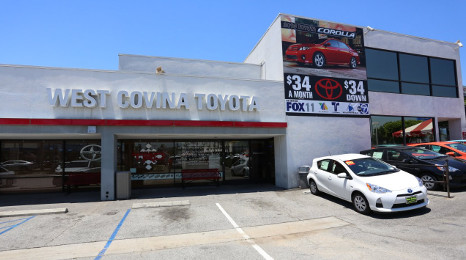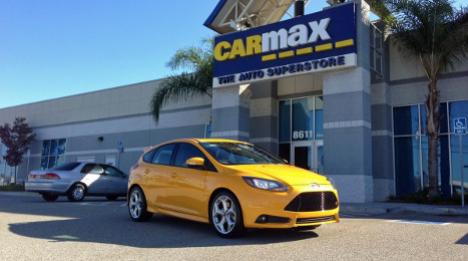AutoNation has increased both its footprint in the Northwest as well as the number of its approved vendors, with the retailer adding the dealer-direct marketplace DealersLink to that roster.
Starting with its store purchases, AutoNation announced Wednesday it has signed agreements to acquire Audi, Mercedes-Benz, Porsche and Volvo stores in the Seattle-Bellevue market from Barrier Motors.
The move will ramp up AutoNation’s Washington sales, as the stores bring in an approximate annual revenue of $355 million, with retail sales of approximately 5,500 new- and used-vehicle units.
This transaction brings AutoNation’s Washington store count to 22 franchises, including 13 franchises in the Seattle-Bellevue market.
Mike Jackson, AutoNation's chairman and chief executive officer, stated, "We are pleased to be adding the Barrier Audi, Mercedes-Benz, Porsche and Volvo stores to our Seattle-Bellevue platform. The Barrier stores have a great reputation in the market. The franchises are in attractive automotive retail locations and the facilities are first class."
Jackson added, "The acquisition will greatly enhance our brand mix in Seattle-Bellevue, positioning us with outstanding premium luxury offerings in the market, where we already represent BMW. The product cycles from Audi, Mercedes-Benz and Porsche are some of the most exciting in the industry. We also look forward to welcoming the Barrier customers and over 300 associates into the AutoNation family."
The transactions are subject to customary terms and conditions, including manufacturer approval, and are expected to close in the fourth quarter 2014, the company said.
Jimmy Barrier, president and CEO of Barrier Motors, said, "I am extremely pleased to have worked with senior leadership of AutoNation to put this transaction together. AutoNation is the largest auto retailer in the United States, with a strong premium luxury business and track record. I am very excited for our associates, who have been a key part of our success in building one of the finest premium luxury automotive retail businesses in America. I look forward to watching the Barrier stores under AutoNation's leadership continue our long tradition of outstanding customer service.”
AutoNation Picks Dealerslink as Approved Vendor
The dealer group also recently announced it has chosen Dealerslink — a dealer-direct marketplace — as an AutoNation Preferred vendor.
All 270 AutoNation dealerships now have approval to implement the DealersLink suite of tools at any of their locations, the company said.
“We’re excited that such a progressive, profit driven organization like AutoNation has given us this endorsement. It opens the door for AutoNation dealerships to leverage the DealersLink Marketplace at a time when access to quality inventory, and having the best tools really drives success. We’re excited that this collaboration will give another strategic advantage to AutoNation, DealersLink, and all of our dealer members.” said DealersLink vice president of sales Travis Wise.
The acquisition of dealerships nearly doubled in the first half of 2014 compared to the same period in 2013.
That’s according to The Blue Sky Report from Kerrigan Advisors, along with research gathered from The Banks Report, which highlighted the 95 completed dealership transactions in the first half of 2014, a 75-percent increase over the 54 made in the same period the prior year.
By far the most bought and sold amongst franchises, General Motors accounted for 25 of the 115 individual franchises sold in the transactions, which also reflects the increase in multi-dealership transactions in the first half of the year. Twenty-one of the 95 dealership transactions included multiple dealerships, a 40-percent increase over 2013’s first half.
Despite the attention GM has received over recent recalls, its perceived value in the dealership market has not wavered. In fact, Erin Kerrigan, the founder and managing director of Kerrigan Advisors, shared her insight with Auto Remarketing and explained how GM franchises may have come out of the situation worth more than they’ve been in at least a decade.
“The values of those franchises really improved dramatically and the handling of the recalls was so well done that there’s a lot more faith in the franchise in the long term, particularly for Chevrolet, which is just such a strong brand,” Kerrigan said. “And I think a lot of the buyers recognize that General Motors is on really solid ground, from a financial standpoint.
“If you think about it, even the best of companies go through crises,” Kerrigan continued. “Toyota had a major crisis. It’s how those companies handle the crisis, from a management standpoint, that determines the real value of the business in the long term. And clearly General Motors was able to handle this crisis and that bodes very well for the value of the franchises that represent the company.”
Although the domestic manufacturers’ sales are on the upswing, it’s probably not a good idea to target the first dealership you see as an acquisition prospect.
“One of the challenges that General Motors and other domestic manufacturers have is that there are still a lot of these franchises,” Kerrigan said. “So the average sale per franchise, of units, is much lower for domestics than for the high-volume imports, like Toyota and Honda.”
Kerrigan pointed out that the blue sky value of the domestic franchises is far more market-dependent when compared to their foreign-based competitors. But if found in the right area, buyers are willing to pay a premium to get their hands on those franchises that have high demand but are not oversaturated with supply.
“In some cases, like if you’re in a market in Texas, you have dealerships there where they’re not as over-dealered in the domestic side and you have domestic dealerships making a lot of money,” Kerrigan said. “In those cases, they can be just as expensive as an import store, or approaching the same value.”
Amongst the publicly traded dealer groups, Group 1 Automotive and Lithia lead the way in the first half of the year on the acquisition front. According to the report, their price-to-earnings multiples grew at double the pace of the sector in the second quarter of 2014. The greatest percentage of the dealership transactions, however, were handled by private acquirers, making up 88 percent, or 84, of the total acquisitions in the first half of this year.
The top-10 private acquirers accounted for 60 of those 84 transactions, with Berglund Automotive Group heading the list with 9 total acquisitions.
The Russ Darrow Group announced this week the acquisition of Amato Mazda in northwest Milwaukee. The inventory from Amato Mazda will be relocated to an all-new Russ Darrow Mazda Milwaukee, expanding the Russ Darrow family in the area, according to the group’s president, Mike Darrow.
“With the addition of this new Mazda dealership, we will now have two Russ Darrow Mazda locations in Metro Milwaukee along with a third Russ Darrow Mazda on the east side of Madison,” Darrow said. “This new facility has enough capacity to easily service the current and future growing Mazda owner base. We truly believe in the Mazda brand and the quality and performance of its vehicles.”
The new dealership will include a full-service maintenance and repair department, for all makes and models, including quick oil changes, as well as a parts and accessories department. Collision repair will be offered at an offsite facility.
Aside from the new amenities, the dealership is also hiring an estimated 30 new employees for sales and technician positions. More information can be accessed via the Russ Darrow Group’s website.
SoCal Penske broadened its presence in the southern California retail sales and service market last week by adding a Toyota store to its dealer group.
With plans for a complete renovation to operate a state-of-the-art facility, SoCal Penske now has Penske Toyota Scion of West Covina in its store portfolio.
Located just off Interstate 10 at Azusa, Penske Toyota Scion of West Covina expands SoCal Penske’s footprint to a total of 11 dealerships in the southern California market.
SoCal Penske president Roger Penske Jr. said, “We are excited to add Penske Toyota Scion of West Covina to our dealer group family and make additional investments in the local community.
“The acquisition of Penske Toyota Scion of West Covina expands our presence in the West Covina Auto Plaza, complementing Audi, Mercedes-Benz, smart and Sprinter, and allows us to offer more vehicle options to a key market in southern California,” he continued.
Group 1 Automotive has announced the acquisition of a Mercedes-Benz dealership in Boerne, Texas, which will operate as Mercedez-Benz of Boerne. The dealership, which also includes a Mercedes-Benz Sprinter commercial vehicle franchise, is expected to generate an estimated revenue of $135 million annually.
“We are delighted to strengthen our relationship with Mercedes-Benz and further expand our scale in the San Antonio metropolitan market,“ said Earl Hesterberg, Group 1’s president and chief executive officer.
Further west, Larry H. Miller Dealerships announced the acquisition of Quality Toyota in Corona, Calif. The dealership, which will be the group’s first in the state of California, will maintain all of its current employees, according to Dean Fitzpatrick, the group’s president.
“Employees are vital to the success of a dealership and we consider the team at Quality Toyota part of the asset,” Fitzpatrick said. “We always work to ensure that current employees transition with the store, and we have training programs in place to encourage their success.”
The dealership has been renamed Larry H. Miller Toyota Corona.
Flick Fusion announced this week its video marketing platform for dealers, offering what it contends is the first of such platforms to automate the video production process, including inventory videos, video emails and other various dealer-related videos.
Brian Cox, the president and chief executive officer of Flick Fusion, says his company offers to dealers the digital platform for their inventory that they need to maximize sales.
“Many dealers want to incorporate video into their marketing plan, but don’t have the resources or expertise to create dynamic videos for all their marketing needs,” Cox said. “Our platform offers a simple, cost-effective method for creating a video marketing strategy proven to attract more web site visitors and convert them into leads.”
Flick Fusion utilizes the power of Google by avoiding Flash and publishing videos in “SEO-friendly” formats and uploads them to YouTube, increasing exposure to a wider market.
“Flash videos can’t be indexed by Google and therefore they don’t boost SEO rankings,” Cox said. “Additionally, many third-party sites don’t accept Flash so dealers can’t benefit from video syndication, which also boosts rankings.”
In addition to the video format, the program also utilizes VidMail, which allows dealer employees to customize videos for individual lead inquiries, which can be custom-made on request with video greetings, vehicle walkarounds and other related dealership videos.
For more information about Flick Fusion, visit their site here.
Sonic Automotive revealed the name of its pre-owned vehicle retail store concept on Monday morning: EchoPark.
The pre-owned program will be launching in Denver this fall.
“We believe Denver is well poised and an ideal environment to launch EchoPark with Denver, Colo. trending as one of the top pre-owned car markets in the U.S.,” said Scott Smith, president of Sonic Automotive. “We have spent years perfecting this concept and we view this as a real game-changer for the pre-owned automotive industry.”
Sonic plans on starting EchoPark with a main hub in Thornton in late fall accompanied by neighborhood stores in Centennial and Highlands Ranch. The group has plans for additional neighborhood stores in Golden and Dakota Ridge.
The company describes the guest experience at EchoPark as one meant to “build long-term relationships with guests by bringing transparency, ease and speed to all of their retail automotive needs.”
CarMax has chosen a new chief marketing officer and senior vice president, hiring Jim Lyski for the job, whose accolades include promoting The Scotts Miracle-Gro brand.
The move is effective immediately, and Lyski now will be responsible for directing and managing all of the company’s marketing functions, including consumer insights and strategic direction, brand, creative, digital, advertising, carmax.com, store marketing, targeted marketing, media public and community relations, and internal communications.
“Jim’s extensive marketing experience and strategic understanding of today’s consumer will be a tremendous asset to CarMax,” said Tom Folliard, CarMax president and chief executive officer. “CarMax is in the midst of a national expansion plan, opening 10 to 15 stores in each of the next two fiscal years. We’re pleased to have Jim join us at this exciting time.”
Lyski served as chief marketing officer of The Scotts Miracle-Gro Company from 2011 to 2014, where he led all brand responsibilities, including global innovation, product development, positioning, advertising, packaging, pricing and promotions.
Lyski also previously served as chief marketing officer at Nationwide Mutual Insurance Company, responsible for corporate strategy and marketing, brand management, advertising and communications.
Lyski has held marketing leadership positions at Cigna Healthcare and FedEx Corp., as well.
Last week’s second quarter conference call with Penske Automotive Group resonated several commonalities with other public dealer groups in the country, primarily the continued search for qualified automotive technicians.
The group’s chairman and chief executive officer, Roger Penske, noted that although his company is not as affected by recent recalls, with only 4 percent of their total sales coming from the domestic manufacturers, Penske is still on the hunt for technicians.
“I would say the right technicians are in tight supply,” Penske said. “We’ve added 200 technicians in our network over the first six months.
“At the moment, I’d say we probably need a couple hundred technicians. We’ll go through that on a very selective basis for the balance of the year.”
While AutoNation continues its massive search and Asbury Automotive Group continues to develop its own in-house development program, Penske leans on its partnership with one of the biggest automotive training schools in the nation.
“One thing we’ve done for a number of years, we’ve had a very strong relationship with UTI, Universal Technical Institute,” Penske said. “They generate about 18,000 technicians a year that they graduate.”
With locations near major cities all over the country, Penske enjoys the accessibility of UTI’s graduates.
“What we do is, we go in and we interview the best technicians and, in many cases, some OEMs have special programs where they particularly train in a step course where they go one level up and they train specifically on an OEM,” Penske said. “So what we’ve done, not only in the truck leasing business, that’s where we have diesel and we need them, we’ve used them as a resource and we’ve got some really good candidates, and I would say that would be our biggest area where we’re gaining candidates.
“And, to me, people coming out of UTI seem to be really good guys to start. Technicians are hard to get; a lot of our guys retire that have all of the expertise so it’s important to grow the space.”
When asked about the advances in technology and the viability of smaller, “mom-and-pop” repair shops, Penske hinted that the future will likely lean in favor of the dealers, who have a far-higher capacity to handle the tech-heavy computer systems of modern vehicles.
“I think we’re going to go through a sea-change here; the technology is growing leaps and bounds over the last four or five years, and as these cars get into the market and are resold, I think they’ll be a real opportunity and increase our customer pay as we go forward,” Penske said. “Also, the availability to have the codes and to have the expertise. We send our technicians to these OEM schools regularly in order to keep them at pace of the technology so I think it bodes well for the retail auto business and the OEM franchise dealers as we go forward.”
As the digital age continues to develop, dealers have had to adapt at an ever-quickening pace to satisfy a perpetually evolving consumer base. For used-car customers, Penske Automotive Group announced during their second quarter conference call on Wednesday that one of their main conduits for sales is via their website.
Roger Penske, the group’s chairman and chief executive officer, believes mastering the digital side of the business is key to limiting competition.
“We have looked at our PenskeCars.com, and we have over 60,000 used cars online there, which seems to be generating quite a bit of traffic,” Penske said. “I think that’s working out from an e-commerce perspective.
“On the used car side, we were up $50,” Penske continued, in regards to profit per car. “When you look at it sequentially, there’s no question that we’ve been able to sustain our margins for the last three or four quarters, which I think is key. We don’t have the inter-brand competition on the new and I think with the used, with the execution of the Internet, if a person wants to buy a particular car, and if the process is efficient and we can get that customer in, we don’t have a competitor on that car.”
To contrast, Mike Jackson, the chairman and CEO of AutoNation, while speaking in his own company’s second quarter conference call last week, addressed a long-term but slightly different goal for the group’s online strategy. Though not referring directly to new or used sales, Jackson wants to get to the point where customers who shop for cars online can get all of the financial logistics squared away before ever setting foot into the dealership.
“Informational sites are useful. They’ve taken us to a certain point, but the customers are not interested in doing all of that work, disconnecting, and then coming to the stores and starting all over again,” Jackson said. “The sites need to reach into the store and transact on real inventory, real incoming inventory, with real pricing, with market data that validates that pricing. And the customer, when they see the car they want, at that price they want, are able to send us a deposit and make it their car."
Jackson noted that the company is investing $100 million, over the course of 2014 and 2015, into this effort, aiming at making the AutoNation website transactional by the end of 2014.
“I think we will have to see how skillful we execute and how the marketplace reaction is, but this was the reason behind why we rebranded the company coast-to-coast. We could not envision doing this with multiple names, we think it’s far more powerful with one name,” Jackson said. “It’s sort of like the Shared Service Center, which took us seven years to fully implement, that gave us both a cost advantage and a performance advantage and, also, in many ways, was a foundational element for this digital undertaking and that we need all the stores on the same technology platform for everything from database management to how we run the company day-to-day.
“It’s certainly not the end of the story over the next two years; there will be many more chapters,” Jackson continued. “But we’re in a very ambitious and exciting phase. I call it an investment phase, that we feel, in our ambitions to build a great company, and a great brand, in the long term, we need to make and hit the right vision for the company and win in the marketplace.”












